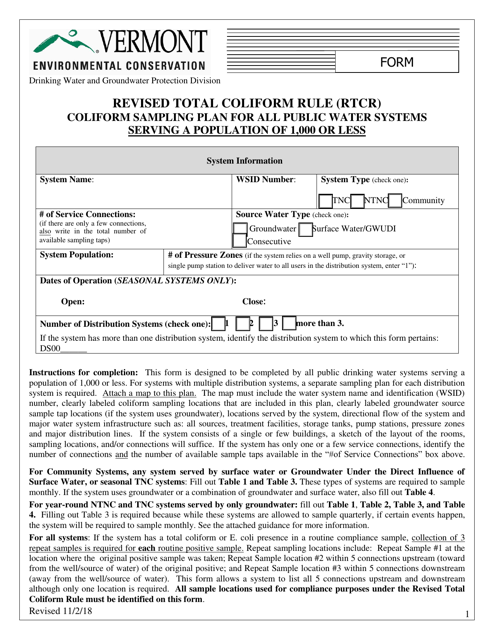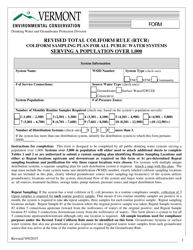Revised Total Coliform Rule (Rtcr) - Coliform Sampling Plan for All Public Water Systems Serving a Population of 1,000 or Less - Vermont
Revised Public Water Systems Serving a Population of 1,000 or Less is a legal document that was released by the Vermont Department of Environmental Conservation - a government authority operating within Vermont.
FAQ
Q: What is the Revised Total Coliform Rule (RTCR)?
A: The Revised Total Coliform Rule (RTCR) is a regulation that establishes drinking water standards for coliform bacteria.
Q: Who does the RTCR apply to?
A: The RTCR applies to all public water systems serving a population of 1,000 or less in Vermont.
Q: What is a coliform bacteria?
A: Coliform bacteria are a group of microorganisms that are commonly found in the environment and used as indicators of water quality.
Q: What is a coliform sampling plan?
A: A coliform sampling plan is a strategy developed by public water systems to collect and test water samples for the presence of coliform bacteria.
Q: Why is coliform sampling important?
A: Coliform sampling is important because it helps to ensure that drinking water is free from harmful bacteria and meets quality standards.
Q: What are the requirements of the RTCR for coliform sampling?
A: The RTCR requires public water systems to develop a coliform sampling plan, collect routine samples, and take corrective actions if coliform bacteria are detected.
Q: Is the RTCR applicable only to Vermont?
A: No, the RTCR is a federal regulation that applies to all public water systems in the United States, including Vermont.
Form Details:
- Released on November 2, 2018;
- The latest edition currently provided by the Vermont Department of Environmental Conservation;
- Ready to use and print;
- Easy to customize;
- Compatible with most PDF-viewing applications;
- Fill out the form in our online filing application.
Download a fillable version of the form by clicking the link below or browse more documents and templates provided by the Vermont Department of Environmental Conservation.













